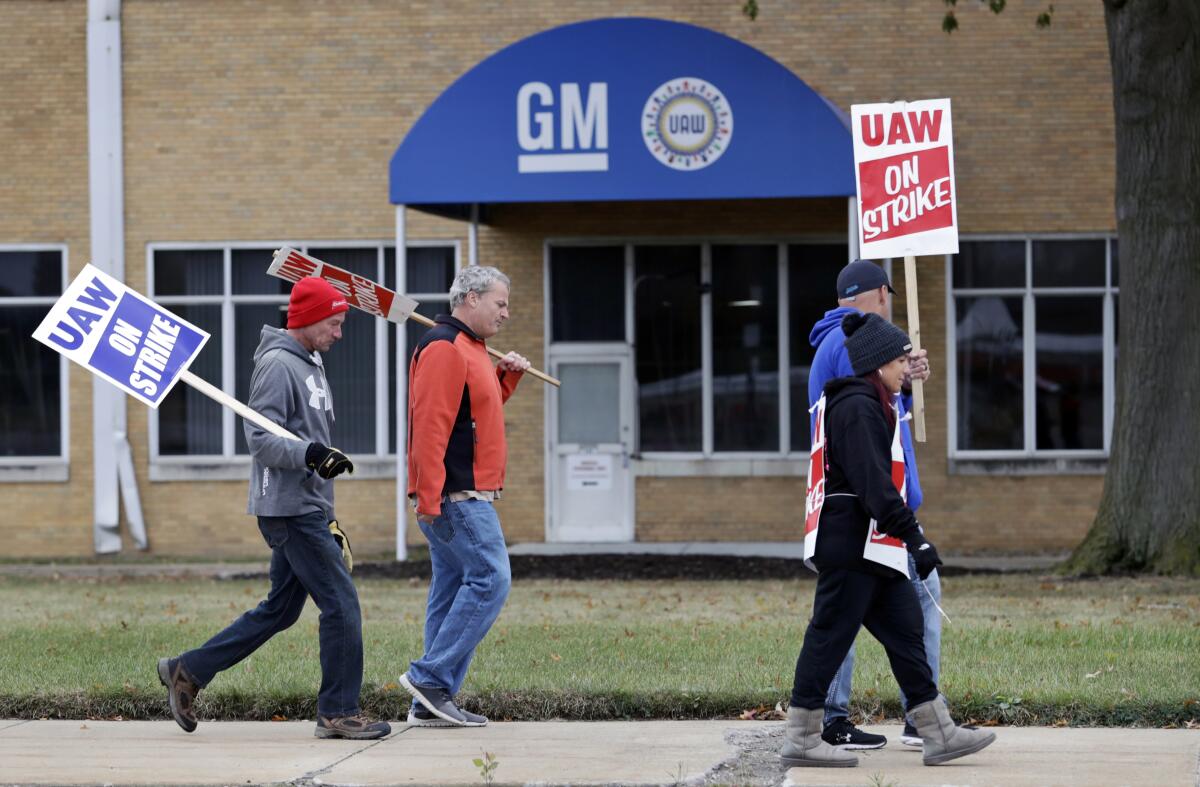GM reaches tentative agreement with UAW to end 6-week strike

- Share via
General Motors reached a tentative agreement with the United Auto Workers union, bringing an end to a 6-week-old strike that had upended U.S. automobile production and cost the industry billions of dollars.
The pact includes a 25% hourly pay raise plus cost-of-living allowances through April 2028, the union said Monday in a statement that confirmed a Bloomberg report. The agreement removes several wage tiers and brings additional workers into the master agreement, including those at the Ultium Cells venture making electric-vehicle batteries.
The terms, which still must be approved by GM’s 46,000 union members, are broadly similar to the deals signed earlier by Ford and Stellantis.
The tentative deal “paves the way for a just transition and wins record economic gains for autoworkers,” the UAW said in the statement. GM employees will return to work while the ratification process is ongoing, the union said.
The company’s shares were little changed in late trading in New York after rising less than 1% during the regular session.
The provisional deal between striking United Auto Workers and Ford includes a 25% hourly wage hike and is subject to union leadership approval.
GM is the last of Detroit’s legacy automakers to reach an agreement with the union, which began its strike on Sept. 15. Ford’s deal last week put pressure on GM and Stellantis to wrap up their negotiations and get back to work. Stellantis was able to finalize its talks with the UAW on Saturday after agreeing to concessions on job security.
The agreements are a big step toward ending a bruising clash marked by tense bargaining and at times nasty rhetoric, particularly from UAW President Shawn Fain. The new union leader made this year’s labor talks a statement on income disparity, renewing a fight between labor and management. Assuming the deals are finalized, the union and companies will have to put any hard feelings behind them and find a way to work together.
President Biden hailed the tentative deals after news that GM had come to terms.
“Today’s historic agreement is yet another piece of good economic news, showing something I’ve always believed: Worker power is critical to building an economy from the middle out and the bottom up, and so is economic growth,” Biden said during an event at the White House.
New strategy
This was the first time all three of the Detroit automakers were struck at the same time, a bet by Fain to keep them guessing by incrementally adding more plants to the work stoppage. His strategy seems to have paid off with record wage hikes and the restoration of some benefits that the union forfeited during the financial crisis more than a decade ago.
The gains come amid a resurgence of labor activism in the United States. Emboldened by tight labor markets and agitated by inflation and risks shouldered during the COVID-19 pandemic, unionized workers have notched a series of victories in the last year at prominent U.S. companies, including Kaiser Permanente and United Parcel Service.
The money automakers spent on stock buybacks to raise shareholder profits, rather than on wages or investments in a green future, helps explain why workers are stepping up the pressure.
The UAW expanded its walkout at GM on Saturday by calling for another strike at the automaker’s Spring Hill, Tenn., plants. The UAW had previously targeted eight assembly plants and 38 parts-distribution facilities from the three automakers, including at GM’s Arlington, Texas, facility that makes SUVs and a pickup truck plant in Missouri. The strikes at Ford and Stellantis ended when those companies reached tentative deals with the union.
Fain already has an eye on the next potential strike of the Detroit companies, moving the expiration of the new contract to the end of April 2028. If the workers walk out then, it would come on May 1, or May Day, which is historically an international day of labor.
The latest strike has taken a financial toll on the automakers, with both GM and Ford pulling their earnings guidance last week due to uncertainty surrounding the union talks. Ford said Thursday that the work stoppage cost the company $1.3 billion. GM said its strike costs had reached $800 million and would cost at least $200 million a week going forward.
GM had some unique issues compared with Ford. The automaker has 300,000 retirees, more than either rival, making improved pension payouts costly. GM also uses temps to make up 6% to 10% of its workforce, whereas Ford has used about 3%, making the impact of changes around temps different for each company.
The UAW said workers at Ultium Cells, the battery joint venture owned by GM and South Korea’s LG Energy Solution, will be part of the master agreement, but the union did not provide details on wages or benefits.
More to Read
Inside the business of entertainment
The Wide Shot brings you news, analysis and insights on everything from streaming wars to production — and what it all means for the future.
You may occasionally receive promotional content from the Los Angeles Times.












